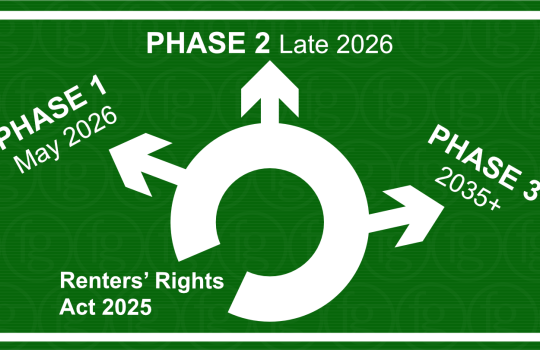Reforming The Home-Buying Process

The UK Government aims to reform the home-buying and selling process in England, Wales, and Northern Ireland. While the initiative promises to modernise property transactions and reduce delays, observers have noted similarities to the previously abandoned Home Information Packs (HIPs).
Fuller Gilbert explores the history of HIPs, the new proposals, and the potential pitfalls that could shape the future of property transactions.
The Rise and Fall of Home Information Packs (HIPs)
Introduced in 2007 under the Housing Act 2004, Home Information Packs (HIPs) were designed to streamline the home-buying process by requiring sellers to provide key documents upfront - such as title deeds, energy performance certificates (EPCs), and property surveys. The goal was to reduce delays and improve transparency for buyers.
Despite its good intentions, the HIPs scheme was discontinued in 2010 after just three years. Several factors contributed to its demise:
- High Costs for Sellers: Sellers bore the financial burden of compiling HIPs, only to find that documents often became outdated before a sale was completed - leading to additional costs.
- Minimal Impact on Delays: The expected reduction in transaction times did not materialise. Conveyancing inefficiencies and property chain complications continued to cause delays.
- Industry Resistance: Many estate agents and property professionals viewed HIPs as unnecessary and redundant, leading to widespread pushback.
The 2025 Government Consultation on Home Buying Reform
On 6 October 2025, the UK Government launched a wide-ranging consultation to overhaul the home-buying and selling process. The initiative aims to tackle long-standing issues such as delays, lack of transparency, and inefficiencies - many of which HIPs also attempted to address. However, this time the Government feels its approach is more comprehensive, tech-driven, and inclusive.
Key Proposals Include:
Digital Property Portals
Sellers would upload essential documents - title deeds, surveys, EPCs - into a centralised digital portal. This would allow buyers to access critical information from the outset, reducing delays and improving decision-making.
Standardised Property Information
A uniform set of required documents for all property listings could create a predictable and transparent process, reducing confusion and inefficiencies.
Addressing Property Chains
Conditional offers could allow buyers to commit to purchases based on specific conditions, helping to stabilise multi-transaction chains and reduce the risk of collapse.
Streamlining Conveyancing
Automating property searches and legal checks could accelerate transaction times and reduce bureaucratic hurdles.
Binding Contracts and Consumer Protection
Optional binding contracts introduced earlier in the process could reduce failed transactions, which currently affect one in three property deals.
Mandatory Qualifications and Code of Practice
Estate, letting, and managing agents would be subject to new standards, including mandatory qualifications and a professional code of conduct, to improve trust and service quality.
HIPs vs. 2025 Reform: A Comparison
Similarities
- Upfront Information Sharing: Both HIPs and the new proposals aim to provide key property information early in the process to improve transparency and reduce delays.
- Delay Reduction Goals: Each initiative seeks to streamline transactions and minimise bottlenecks.
Differences
- Scope and Ambition: The 2025 reform goes beyond document provision, addressing systemic issues like property chains, legal inefficiencies, and consumer protection.
- Cost Distribution: Unlike HIPs, which placed costs solely on sellers, the new proposals aim for a fairer cost-sharing model, supported by low-cost digital systems.
- Stakeholder Engagement: The current consultation involves a broad range of stakeholders—including estate agents, solicitors, buyers, and sellers—to ensure reforms meet market needs.
- Digital Focus: HIPs were largely paper-based. The new proposals embrace digital tools such as property logbooks, ID verification, and standardised data sharing.
| Feature - scroll to continue with content... |
| continue reading article... |
Potential Pitfalls of the New Reforms
Despite the promise of the new proposals, several concerns have been raised that could risk repeating the mistakes of HIPs.
Rushed Implementation
There are fears that the reforms are being accelerated in response to the housing crisis. If not carefully planned, digital information packs could become outdated or incomplete, leading to additional costs and frustration. Ensuring low-cost, reusable systems with clear validity periods is essential.
Binding Contracts Before Due Diligence
Introducing binding contracts early—before legal checks are complete—could pose risks, especially for buyers relying on mortgage financing. If issues arise, buyers may be locked into deals and lose deposits. Clear safeguards are needed to protect consumers.
Shifting the Burden to Sellers and Agents
Industry professionals warn that placing too much responsibility on sellers and agents to gather documents and conduct searches could shift delays to the pre-listing phase. Without adequate support, this could lead to increased costs and complications. Concerns also remain about the accuracy and timeliness of local authority searches.
Pros and Cons of the New Consultation
Pros
- Enhanced Transparency: Digital portals and standardised documents could provide clearer insights for buyers and sellers.
- Potential Cost Savings: Streamlining processes and reducing delays could lower costs for all parties.
- Addressing Chain Issues: Conditional offers could reduce the risk of chain collapses.
- More Efficient Legal Processes: Automation could speed up conveyancing and reduce bureaucratic hurdles.
Cons
- Challenges in Implementation: Technical issues and digital literacy gaps could hinder adoption.
- Risk of Binding Contracts: Early commitment could expose buyers to financial risks if problems arise.
- Increased Burden on Sellers and Agents: Without proper support, the reforms could shift delays and costs rather than eliminate them.
Summary
While HIPs failed due to poor adoption, high costs, and limited industry support, the UK Government’s 2025 consultation represents a more thoughtful and modern approach. By focusing on digital solutions, transparency, and stakeholder engagement, the reforms have the potential to significantly improve the home-buying process.
However, success will depend on careful implementation. The government must address concerns around binding contracts, cost allocation, and administrative burden. If these issues are resolved, the reforms could mark a turning point in the UK property market. If not, they risk repeating the missteps of the HIPs era—making the process more complex and costly for everyone involved.
View the full consultation and submit responses here
Related read: Speeding Things Up?
This article is for informational purposes. Always seek professional advice before making any property and/or financial decisions.














